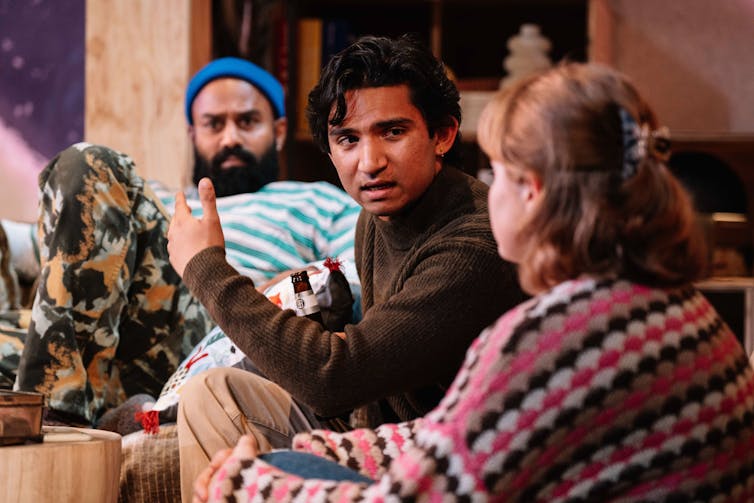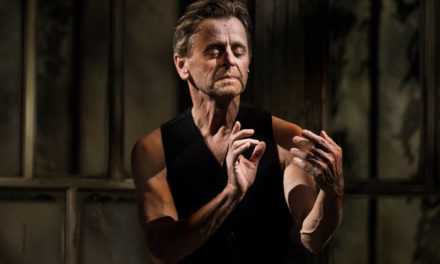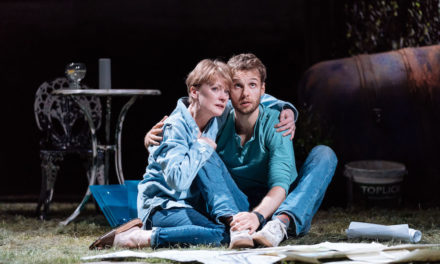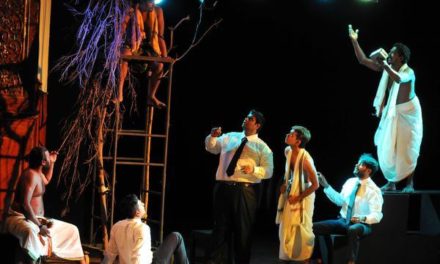Review: Stay Woke, by Aran Thangaratnam, directed by Bridget Balodis.
The lingering smell of incense and the hurried crunching of murukku and thattu vadai greets the audience as we settle into their seats to watch Stay Woke, a new dark comedy about love, loss and pain.
Two estranged Tamil brothers, Niv (Dushan Philips) and Sai (Kaivu Suvarna) are spending the weekend away in Mount Buller with their partners.
At first, Niv tries to smooth out old sibling tensions.
His attempts soon fizzle as he learns more about Sai and his partner Kate (Rose Adams).
Niv’s partner Mae (Brooke Lee) is a non-binary anti-racism consultant for the corporate sector.
Despite being misgendered by Kate on several occasions, Mae is a lot more accepting of Kate than Niv, who confronts Kate and her historical privilege during dinner, games, and late-night conversations.
Niv lambastes Kate for failing to know about the Sri Lankan government’s massacre of Tamils throughout the war, including more than 100,000 deaths during the final stages in 2009.
Niv and Sai are repeatedly plunged into awkward and tense exchanges: their relationship with each other is mediated through their love interests.
The plot thickens as they are forced to negotiate important personal relationships with the desire to “stay woke”.
High tensions
The term “woke” originated from Black Americans and simply means to be alert to injustices in society, especially racism.
In a commencement address at Oberlin college in 1965, Reverend Martin Luther King Jr delivered a speech stating:
the great challenge facing every member of this graduating class is to remain awake, alert and creative through this great revolution.
In Stay Woke, intimate atmospheric spaces (designed by Matilda Woodroofe) give a soothing contrast to the high tensions. The wooden furniture and kitchen nook depict a cozy and ordinary ski lodge. The smooth wooden floorboards of the house act like a mountain slope: they enable raw exchanges, giving the impression the audience is viewing fleeting moments out of public sight.

Niv explodes into fury more than once at Kate, including when she shares photographs of her in “brownface” during an Aladdin themed party.
That Kate’s father is a police officer does not help the situation.
In the play’s dramatic ending, Niv turns his attention to the audience. Speaking directly to us, he calls on us to bear witness to the discrimination black and brown people face at the hands of police.
Niv confronts the audience at the hypocrisy of it all. His sense of injustice is palpable.
An intelligent dark comedy
Niv, Mae, Sai, and Kate represent an ever-changing society in the struggle to achieve equality and justice. The dark comedy brilliantly lures the audience into the personal and political significance of staying woke, before turning the tables back on us.
Incremental positive changes are possible. In the end, Niv and Kate agree to begin unraveling the power dynamics that keeps them polarised; Niv and Sai agree to stay connected.
Thangaratnam’s brilliance is in capturing the fragility of these relationships located within broader systems of oppression.
Stay Woke is witty and clever storytelling. Staying woke is a life-long exercise in resistance to brutal regimes of power and violence.
Thangaratnam is part of a growing number of diaspora Tamils telling new stories about the struggles and joys of life in new lands.

In the postwar period, these stories hold spaces to process, reflect and heal from difficult pasts.
As an Eelam Tamil who has grown up in Australia, I valued the play beyond the passionate acting performances and high production quality. It reminded me of the importance of telling stories of injustice to those most affected by it.
Niv and Sai’s homeland is currently facing its worst economic crisis since independence, but Stay Woke leads us to be cautiously optimistic about creating respectful dialogue, systemic change and trusting relationships.
Stay Woke is at Darlinghurst Theatre Company until April 17.
This article was originally published on The Conversation on April 5, 2022, and has been reposted with permission. To read the original article, please click here.
This post was written by the author in their personal capacity.The opinions expressed in this article are the author’s own and do not reflect the view of The Theatre Times, their staff or collaborators.
This post was written by Niro Kandasamy.
The views expressed here belong to the author and do not necessarily reflect our views and opinions.


















